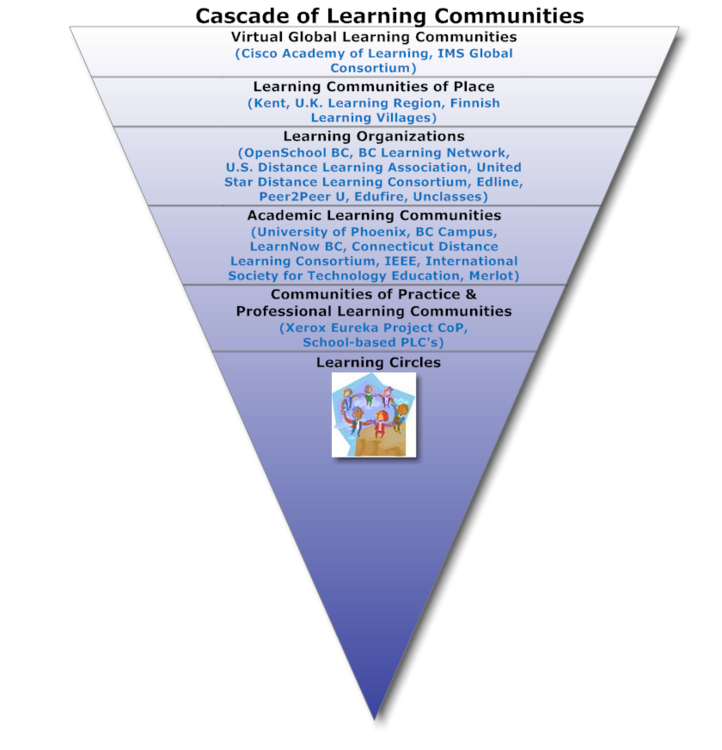Course:ETEC522/2010ST1/LearningCommunityEnvironments
Module 11: Learning Community Environments Project Page
Module 11 Objective
The objective of this OER is to provide ETEC522 participants with a working knowledge of the emerging market of online learning communities. Upon the successful completion of this module, participants will better understand the market of online learning communities and what it takes to start a successful business in the area.
Introduction

Although learning communities have an established history and reached near ubiquity, how they are being used continues to develop in new and exciting ways. An Online Learning Community is a common place on the Internet that addresses the learning needs of its members through collaborative partnership. It allows a group of people to work together as a community to achieve a shared learning objective, which may be proposed by an instructor or driven by the personal interest of its members. Communication in online learning communities may occur through various Internet-supported devices such as discussion threads, podcasts, and vodcasts. Online learning communities may utilize various tools such as instant messaging, message boards, LMS, wikis, social networking, learning object repositories and blogs.
Previously, the unit of instruction was the individual learner. However, since the 1990s, Piagetian constructivist theory and the Information Processing approach have had great influence on educational practices. As such, many researchers and practitioners have switched to the idea that knowledgeability is better thought of as cultural practices - something belonging to various learning communities. Learning communities can take many forms. However, all approaches promote the intentional linking of individuals to promote opportunities for active learning.
In the world of E-learning, the closest thing to the excitement of a Social Network is a Community of Practice (CoP). According to Etienne Wenger, a CoP is characterized by "a shared domain of interest" where "members interact and learn together" and "develop a shared repertoire of resources" (Downes, 2005).
Online communities face several challenges among which some are technical and some are social. The technological challenges relate to the continuous development and improvement of tools that will allow participants to utilize them. In computer-mediated environments, one major challenge is to maintain both social organization and community spirit. A satisfying degree of transparency is achieved when technology does not interfere with the exchange of information and communication (Mason, 1994).
Online communities also face social challenges that include social organization of the 'virtual commons', social interaction, access to technology equity issues, gender issues and dehumanization issues (Vrasidas et al., 2003). Often times, participants are attracted to online learning communities and virtual environments because they believe they can gain something valuable by collaborating with other members of the community. Smith (1992) has suggested some powerful benefits of participating in online learning environments:
- Instant network of contacts with useful skills (social network capital)
- Personal and distributed intelligence
- Mutual trust
- Just-in-time answers to questions (knowledge capital)
- Psychological support from others with common experience (communion)
Types of Learning Community Environments
These are some of the many online communities shaping virtual learning today:

Adapted from the categorizations in Learning Communities: A Nested Concept of Expanding Scale (Faris & Wheeler, 2006)

Vector Analysis
Vector 1: Leading Learning Applications
Vector 2: Leading Solution Providers
Vector 3: Stability and Usability
Vector 4: Total Cost of Ownership (TCO)
References
Downes. S. (2005). E-Learning 2.0 E-Learning Magazine. 17 October 2005. Retrieved 2 July 2010 from http://elearnmag.org/subpage.cfm?section=articles&article=29-1
Faris, R. & Wheeler, L. (2005). Learning Communities of Place: Situating Learning Towns Within A Nested Concept of Social Learning Environments. Proceedings of the Australian Learning Communities Network (ALCN) National Conference 2006 September 25-27, Brisbane, Queensland. Retrieved 15 July 2010 from http://www.members.shaw.ca/rfaris/docs/Learning%20Communities%20of%20Place.doc
Mason, R (1994). Using communications media in open and flexible learning. Greenwich, CT. Information Age Publishing. London. Kogan Page.
Smith, K. A. (1992). Cooperative learning: Effective teamwork for engineering classrooms. Retrieved July 7, 2010, from http://fie.engrng.pitt.edu/fie95/2b5/2b54/2b54.htm
Vrasidas, C.,Zembylas, M and Chamberlaine, R. (2003). "Complexities in the evaluation of distance evaluation and virtual school." Educational Media International, Volume 40, Issue 3 & 4 September 2003 , pages 201 - 208.
Continue to Vector 1: Leading Learning Applications